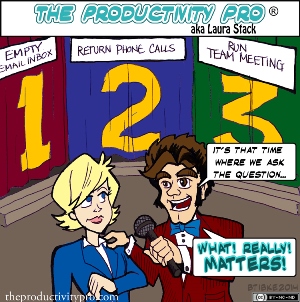“It is not enough to be busy. So are the ants. The question is, what are we busy about?”—American philosopher Henry David Thoreau.
 As we enter 2015, I’d like to pose a question to anyone reading this who feels a bit overwhelmed: how will you regain control of your time?
As we enter 2015, I’d like to pose a question to anyone reading this who feels a bit overwhelmed: how will you regain control of your time?
I’ve spent most of my career providing answers to that question, in terms of time management, self-discipline, setting personal boundaries, intelligent use of new technology, flexibility, speed, and more. The answers are many and multifaceted, because there’s no single solution… and there really can’t be as long as society and technology continue to evolve. I’m not sure we’ll ever completely test all the options.
Strategies like task management, setting priorities, and boosting ROI are basic to this process, and all are necessary to hold your own. But the very first step toward increased productivity is something I rarely address directly, because it is so basic—and frankly, most of us take it as a given. But sometimes it’s a good idea to remind yourself to question the tasks on your list and select them based on relevance.
We all have regularly scheduled tasks we have to perform to keep our job processes running smoothly—whether that means clearing email, making sure everyone on the team is at the weekly meeting, or answering the customer service questions that came in overnight. On top of that, we have to fill out timesheets and other forms to satisfy HR, and handle all the operational tasks necessary to make a profit.
Then there are the tasks we want to accomplish at some point, like upgrading the IT system, tweaking workflow, or auditing the books. Things that don’t necessarily have a due date but are important to do as the schedule allows. The challenge is that some people never get around to Someday items. You may not feel you have much choice about the tasks that consume your time, but in fact you do. We must always question the value of each task, based on how relevant it is to maximizing productivity and profits.
Organization, Team, and You
Relevance isn’t a fixed aspect of a task, like its specifications or budget. It can change over time. Tasks that don’t fit your job description in the first place should go back to those they belong to; that’s obvious. And we all know to check legacy tasks to see if anyone will miss them if they disappear. Should you be filling out a paper timesheet? HR might need to examine its relevance. Or you may find you can replace your 30-page monthly report with an executive summary just one page long, for example. But relevancy goes deeper. We can all benefit by regularly inspecting all tasks at three levels: organizational, team, and personal.
On an organizational level, suppose the company could benefit from a new phone system, and you’ve picked an economical, effective solution. If you don’t get that done, in a few months that solution will probably be outdated. Telephony evolves quickly, and costs consistently drop. Your solution may no longer seem best or relevant by the time you get around to it, and you’ll have to start your research over again.
On a team level, that motivation program you’ve been dabbling with since last year, where the grand prize is a new Kindle Fire HD, may not be such a big deal anymore—since you can buy a Fire HD for less than $100 now.
On a personal level, by the time you get a master’s degree in Finance to pump up your ROI, your job may have evolved to make it less relevant. An MBA may prove a better option.
The same sort of reasoning applies to all other work tasks as well, whether required or desired. How many of your tasks are still relevant to your work now and in the future? Take a thoughtful look at each. Don’t skip over anything, thinking, “Oh, that never changes.” It might.
Review task relevance regularly. You can still delegate much of your work, especially as you climb higher on the hierarchy, but verify its value, and move quickly and decisively. If you find something that seems irrelevant, or at least less relevant than before, check in with your leadership; there may be a reason for doing it that way. If not, revamp or replace it. You’ll save your organization time and money, thereby boosting the bottom line.
How do you handle task relevance—and have you checked it lately?
© 2014 Laura Stack. Laura Stack, MBA, is America’s Premier Expert in Productivity™. For over 20 years, Laura has worked with business leaders to execute more efficiently, boost performance, and accelerate results in the workplace. Her company, The Productivity Pro, Inc., provides productivity workshops around the globe to help attendees achieve Maximum Results in Minimum Time®. Laura is the bestselling author of six books, with over 20 foreign editions, published by Random House, Wiley, and Berrett-Koehler, including her newest work, Execution IS the Strategy (March 2014). Widely regarded as one of the leading experts in the field of performance and workplace issues, Laura has been featured on the CBS Early Show, CNN, the Wall Street Journal, and the New York Times. Connect via her website, Facebook, or Twitter.


